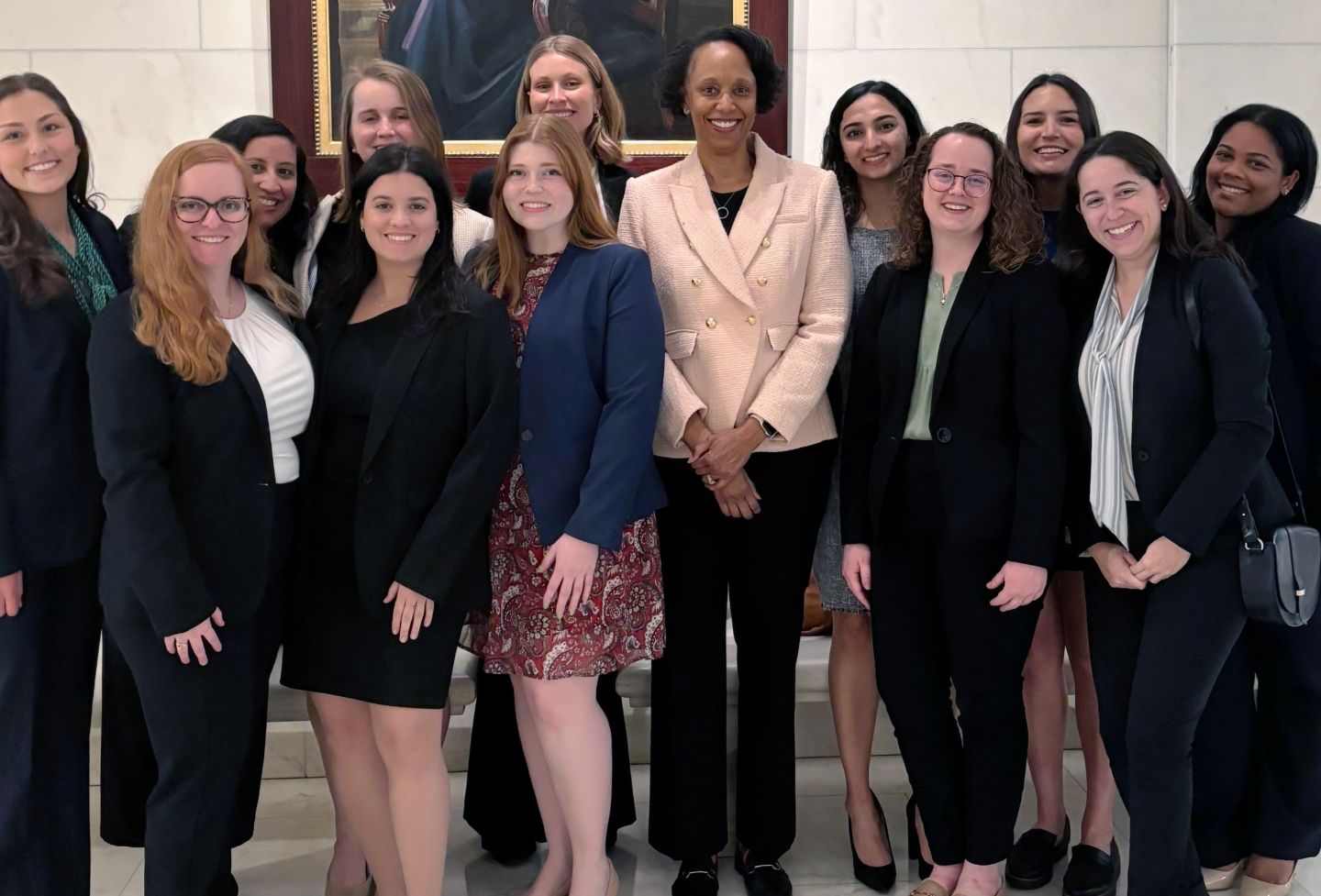As July turned into August last year, Petr Vasilash, a Ukrainian immigrant living in Oregon, was on the brink of being deported to the war-torn country he left 20 years ago, after serving his sentence for attempted assault. Meanwhile, Harry Hild and Meg Pritchard, who were then second-year students at the University of Virginia School of Law, were finishing up their summer associate positions in the Washington, D.C., offices of Williams & Connolly and Covington & Burling.
As their mentor, Professor Xiao Wang puts it, “When I was in their position, I blew my summer earnings backpacking around Norway.”
Instead, soon after their summer jobs ended, Hild and Pritchard dove directly into Vasilash’s 1,500-page case file to write a brief appealing his case to the U.S. Circuit Court of Appeals for the Ninth Circuit — and ended up securing the kind of win seasoned appellate attorneys would be pleased to have on their resumes.
“That sort of effort, care and diligence makes a big difference to a client like Petr, who had been representing himself and is probably distrustful of the legal system,” Wang said. “That’s one of the things I’ve been most impressed with since I joined UVA Law this year — our students put in the work and are dependable self-starters.”
The Ninth Circuit Pro Bono program asked Wang to review the case while he was still teaching at Northwestern University’s Pritzker School of Law. He took the case because it had the potential to reach the Supreme Court as a challenge to the approach federal courts use to determine whether a particular state criminal conviction carries adverse immigration consequences.
When Wang arrived in Charlottesville, he approached the faculty of the Law School’s Appellate Litigation Clinic, Professor Scott Ballenger ’96 and lecturer Cate Stetson ’94, on a potential collaboration. Ballenger and Stetson in turn reached out to clinic students Hild and Pritchard, who leapt at the opportunity to work with Wang on a case presenting these complex legal issues under the auspices of the clinic.
Both Ballenger and Stetson also lent their own considerable litigation expertise to the case. Both have had long careers in appellate practice since graduating from UVA Law — including multiple appearances before the Supreme Court — and Stetson is co-head of the appellate practice at Hogan Lovells. Professor Amanda Frost and another appellate clinic student, Ben Buell ’24, helped parse out the immigration issues, while Professor Anne Coughlin lent insight on the criminal attempt landscape.
The government was seeking to deport Vasilash because he was convicted in 2010 of attempted assault under Oregon law. For immigration and federal sentencing purposes, federal courts use a “categorical approach” to determine whether individuals should be removed from the country — if every category of crime in the state law under which the defendant was convicted is also a crime under federal law, then the state conviction will support deporting the defendant.
The UVA students’ job was to show that Oregon criminalizes conduct that federal law does not, Wang said.
“As attorneys, we’re not necessarily defending the conduct our client may or may not have engaged in,” Wang said. “What we’re trying to do is navigate this person’s legal challenge to stay in this country.”
While Hild essentially memorized the case file to get up to speed — he could ultimately pinpoint the page location of virtually any relevant fact — Pritchard read and organized “a couple hundred” Oregon court cases to determine that the state’s definition of an “attempted crime” is much, much broader than the federal definition.
The students divided up the writing for different sections of the brief and met each of their internal deadlines in a tight briefing schedule, often sending work into the wee hours of the morning.
In the final week before the opening brief was due, the team holed themselves up in a small room with the draft on a big projector screen, wordsmithing each sentence, comma and semicolon.
“It was just the most amazing experience we could possibly have in law school,” Pritchard said.
The team filed their 14,000-word opening brief and began preparing for the next steps, including a reply brief. But just days before the government’s response was due in November, the government attorney told Wang that they would seek remand. That is, they would ask the judge to send the case back to the immigration authorities. Because the judge did not issue a written opinion, the case doesn’t resolve the legal question for future immigration appeals, but requires immigration authorities to pause Vasilash’s deportation to re-review his case in light of the arguments raised by the students. And in some cases, the government will decline to continue to pursue deportation altogether.
“It’s a complete victory for our client,” Wang said. “Having litigated several immigration cases and looked into this question before, I believe the government seeks this type of remand before briefing very rarely — only a few times a year out of thousands of cases.”
Perhaps more important, Wang said, they will add Vasilash’s brief to the briefs and filings database of the National Appellate Clinic Network, a project Wang created to provide a platform for appellate clinics around the country to share briefs, practice upcoming arguments and discuss classroom ideas.
“This brief will be publicly available and publicly searchable,” Wang said. “Whether they’re a clinic student, a clinic faculty member, or someone like Petr who’s going to represent themselves pro se, they’ll at least be able to find this brief.”
Founded in 1819, the University of Virginia School of Law is the second-oldest continuously operating law school in the nation. Consistently ranked among the top law schools, Virginia is a world-renowned training ground for distinguished lawyers and public servants, instilling in them a commitment to leadership, integrity and community service.


